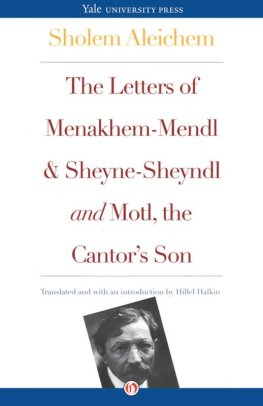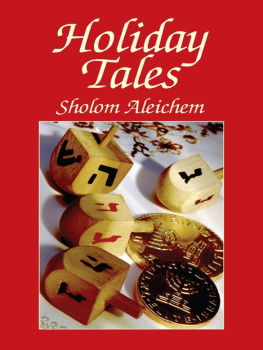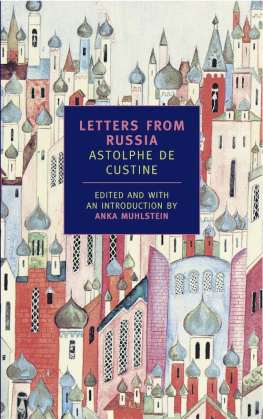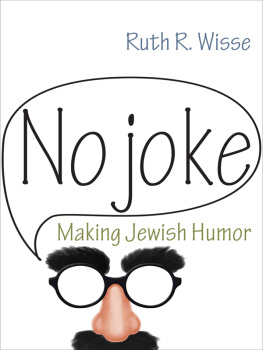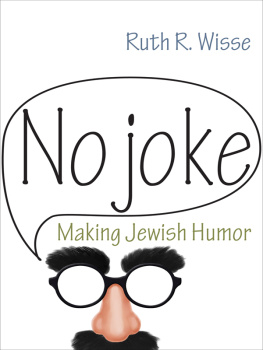The Letters of Menakhem-Mendl and Sheyne-Sheyndl
and
Motl, the Cantors Son
by
Sholem Aleichem
Taken together, Sholem Aleichems three great semicomic works, Tevye the Dairyman, The Letters of Menakhem-Mendl and Sheyne-Sheyndl, and Motl, the Cantors Son, might be said to compose a right triangle. The sides of the right angle are formed by Tevye and Menakhem-Mendl, which meet each other squarely. Motl joins the two obliquely. The trio bounds Sholem Aleichems fictional world.
Each moves along a geographical line. Tevye shuttles back and forth from his native village of Boiberik to the nearby Ukrainian capital of Kiev, called Yehupetz by Sholem Aleichem. Boiberik is even closer to Kasrilevke, the town in which Motl grows up and the wife and children of Menakhem-Mendl live. We encounter Menakhem-Mendl, however, mainly in Yehupetz before he heads for America, which is also the destination of Motl and his family. And it is in Yehupetz that Tevye and Menakhem-Mendl quite literally in a chapter of Tevye the Dairymanrun into each other, while it is from Boiberik-Kasrilevke that Tevye and Motl set out and in New York City that Motl and Menakhem-Mendl (although only in one version of his story) end up. These three points are the physical coordinates of Sholem Aleichems fiction, and nearly everything he wrote takes place in them or the intermediate space between.
Thematically, too, these three works, all of which share an episodic structure resulting from their irregular serialization in the Yiddish press, enclose a common world. In it we find the typical components of a Sholem Aleichem family: the roaming, harried, mentally curious husband; the conservative, querulous, stay-at-home wife; the strained but loyal relations between them; the independent child that goes its own way. We find the economic fight for survival, a preoccupation in most of Sholem Aleichems writing as it was of the Russian Jewry he wrote about. We find the disintegration of traditional eastern European Jewish life beneath the hammer blows of modernization, emigration, and assimilation. And we find the recurrent sequence of dream, disappointment, and new dream, that repetitive pattern of nadir, rise, fall, and recovery that is the psychological matrix of Sholem Aleichems most memorable characters and has been compared by the critic Dan Miron to the great life-death-resurrection cycles of religious myth.
A cursory look at Sholem Aleichems biography reveals this to have been the pattern of his own life. Born Sholem Rabinovich in 1859 in the Ukrainian town of Pereyaslav, he passed a happy childhood in the rural community of Voronko, where his father, Nachum, was a well-to-do and respected figure, a master of many trades who, as Sholem Aleichems daughter Marie Waife-Goldberg wrote years later, acted as agent for land-lease properties, supplied sugar mills with beets, ran the rural post office, traded in wheat, handled freight on barges on the Dnieper River, cut lumber, fattened oxen for the market, and managed at the same time to run a dry-goods store that also sold groceries, hay, oats, home remedies, and hardware.
These years ended suddenly for Sholem, who was twelve, when his father was swindled and ruined by a business partner. The family moved back to Pereyaslav, where Nachum opened an inn in the hope of reestablishing himself. The venture failed, Nachums wife died of cholera, and the new wife he took had all the attributes of the wicked stepmother of a fairy tale. One of the most vivid memories described in Sholem Aleichems autobiography From the Fair is of being stationed in front of the inn to attract customers, daydreaming of the riches that would come his way if he succeeded, only to suffer his stepmothers curses when night fell on its empty rooms.
Just as suddenly, however, this emotionally depressing adolescence underwent a miraculous reversal. Sent into the world by his father to seek work as a Hebrew tutor, the eighteen-year-old Sholem landed, by sheer luck, the ideal job: a position with a wealthy landowner named Elimelech Loyeff, one of the few Jews of the times to possess a country estate in the manner of a Russian aristocrat. Not only that, the child Loyeff sought a tutor for was his charming teenage daughter Olga. Tutor and pupil fell in love, and Sholem spent the next three years in a pastoral idyll as an honored member of the household.
Then disaster struck. The young couple made the mistake of showing their affections too openly, and Olgas father banished the tutor from his paradise. For the next four years the lovelorn Sholem drudged away as a small-town certified rabbilittle more than a government registry clerk for Jewish births, deaths, marriages, and divorces until his luck changed again. Having stayed secretly in touch all along, he and Olga eloped, and Elimelech Loyeff unexpectedly made his peace with the match. Supported by his new father-in-law, Sholem now began to devote himself full time to his writing, using the pen name of Sholem Aleichem for the first time. When Loyeff died of a heart attack in 1884 the Rabinoviches inherited most of his property, which they sold for enough money to live comfortably for the rest of their lives.
The poor son of the wicked stepmother was now an independent author-prince. Between 1887 and 1890 he wrote his first three mature novels, Sender Blank, Stempenyu, and Yosele Solovey, and founded the Yiddishe Folks Bibliotek, or Jewish Folk Library, an ambitious project that made him Yiddish literatures foremost publisher. But the wheel of fortune was still spinning. In 1888 Sholem Aleichem moved with Olga to Kiev, where he took to speculating on the stock exchange. For a while he did well. Then, in 1890, the market crashed and he lost everything.
Elimelech Loyeff s inheritance had gone up in smoke, and the Rabinoviches were left bankrupt with four small children. (Two more were still to come.) They fled Kiev to escape their creditors, traveled homelessly for a while, and finally settled in Odessa, where Sholem Aleichem borrowed money from Olgas family and reinvested in the market, determined to recoup his losses. Once again he succeeded initially; once again his shares ultimately plunged, wiping him out. Forced to start over from scratch, the family returned to Kiev, where Olga studied dentistry and opened a practice while her husband found work as a broker and continued to write.
They remained in Kiev until 1905. This was the longest period of economic security that Sholem Aleichem was to know, and in it he wrote the serialized chapters of Tevye the Dairyman, his novel The Bloody Hoax, several volumes worth of subsequently collected short stories, and a number of plays for the Yiddish stage. Life, so it seemed, had settled down at last until, following the abortive 1905 revolution, a wave of pogroms swept over Russia and through Kiev, killing hundreds of Jews and coming dangerously close to the hotel in which the Rabinoviches were hiding. Badly shaken, they decided to leave Russia and join the mass westward flight of its Jews.
Sholem Aleichems last years were marked by wandering (mostly in Switzerland, Germany, and Italy), illness, and financial worry. Although he was the worlds most famous Jewish writer, read by a vast audience in the numerous Yiddish newspapers and periodicals in which he appeared, this rarely translated into economic success. Time and again he pinned his hopes on some new literary venture; time and again he fell victim to unscrupulous publishers, badly drawn contracts, feuding editors, papers forced to cut their budgets; time and again he had to resort to exhausting reading tours or hurried writing that did not reflect his full talents. In 1906 he traveled by himself to New York, hoping to capitalize on the vigorous cultural life of the Jewish immigrant community there. At first he was exhilarated by his reception, which included an annual five-thousand-dollar contract an unprecedented sum in those days with the new Hearst-published

